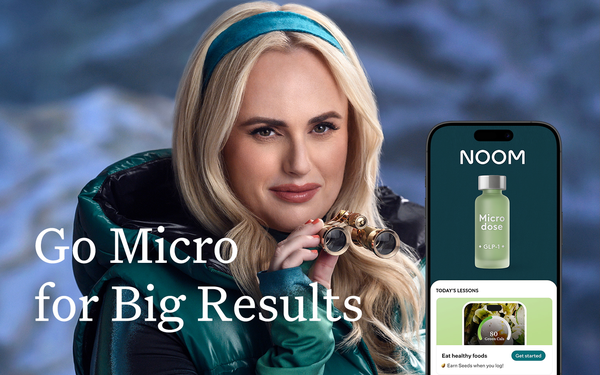
“Noom’s going micro: micro habits,
micro wins, microdosed GLP-1s,” declares actress Rebel Wilson in a TV spot that launched Sept. 18 as part of an anything-but-micro new
campaign from the telehealth app.
“I've been here for months and my weight won't budge. I'm stuck,” a woman lodged on a plateau then tells Wilson, to which the brand’s
newly crowned Chief Wellness Ambassador replies, “Been there. But Noom's microdoses of motivation and microdosed GLP-1s can help.”
The ad -- and another Wilson spot -- end with the line “Micro changes, big results. Get started at Noom.com.”
Consumers who visit that site will
find Wilson backing up a large headline: “Go Micro for Big Results.”
advertisement
advertisement
The campaign -- which includes broadcast, cable, streaming, social and digital placements -- is backed by
Noom’s “biggest marketing investment in a couple of years,” Chief Brand Officer Rachel Mahoney tells Marketing Daily. Creative has been done in-house, with major buys handled
by Horizon Media.
Wilson’s references to micro-habits and micro-wins refer to elements of a free Noom platform that also launched Sept. 18.
Micro-habits involve encouraging
consumers “to take easy first steps that lead up to big results,” says Noom CMO Peter Scherr. Such “micro-habits” as eating a healthy snack or achieving a daily step goal then
reward users with benefits like gift certificates or charitable donations, he notes.
“Micro-wins come about when micro-habits lead to better health,” he continues.
“The idea behind the campaign is, peak health doesn't require peak effort,” says Scherr. “The campaign marks a key moment in the evolution of Noon, showing that small steps
can create big results."
“The idea of ‘micro’ allowed us to wrap the habits and the microdosed GLP-1s together, which is really what differentiates Noom,” explains
Mahoney.
Unlike the micro-habits and mico-wins, Noom’s microdosed semaglutide GLP-1 isn’t free. Launched last month and priced from $119 to $199 a month, microdosing involves doses
25% or less than typically prescribed ones. Besides price, notes Scherr, an advantage is the minimizing of side effects, “one of the key detractors for people adhering to GLP-1 use.”
Back in April, Noom was campaigning for new rules that would in essence
allow it to keep selling compounded GLP-1s -- despite the FDA’s no longer allowing such sales. But the concept of “personalized medication” through microdosing has
apparently allowed the brand to skirt that issue.
Scherr assures Marketing Daily that “our medications are still compounded, but they are in full adherence to all regulatory
mandates from the FDA.”
As for Wilson, who back in 2020 embarked on a pre GLP-1-era regime that resulted in her losing 80 pounds, Mahoney says she turned to Noom last year to maintain
her weight loss and engage in ongoing healthy habits.
“We picked Rebel because she makes health and wellness feel approachable,” adds Scherr. “She’s been on the journey
herself, so when she talks about this issue and the challenges, people believe her. She brings authenticity -- and, of course, humor -- that makes people actually want to engage. And her personal
journey mirrors our philosophy.”
He adds, “Health doesn’t have to feel overwhelming. It’s not all or nothing.
It’s something you do every day.”